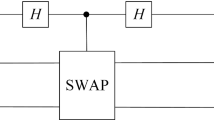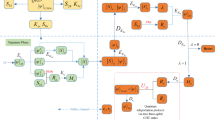Abstract
Generally, in a quantum signature protocol, the signature is produced with the signatory’s classical private key, which is a secret bit string. In most of the signature schemes, it is assumed that the classical private keys are secretly kept. However, in practice, the protection of the classical private key may be vulnerable to various special attacks such as side channel attack, power analysis and cool boot attack. The classical private key may also be disclosed due to the mismanagement of its owner and distributor. Once the signatory’s private key is disclosed, the quantum signature system can be broken. In this paper, a novel quantum signature scheme without classical private key is proposed. In this protocol, the signatory and the trusted third party share the Bell states. The signatory signs a message with the Bell states rather than classical private key. The quantum signature is verified with the Bell states as well. Therefore, it is impossible for any quantum adversary to forge a particle by getting some information about the classical private key. The security of our scheme fully relies on the quantum property of the physical particle. Our scheme can resist against various attacks such as forgery attack, disavowal attack, inter-resending attack and measurement attack. Our signing protocol has the better qubit efficiency than the similar ones.
Similar content being viewed by others
References
Diffie, W., Hellman, M.: New direction in cryptography. IEEE Trans. Inf. Theory. 22(6), 644–654 (1976)
Rivest, R.L., Shamir, A., Adelman, L.: A method for obtain digital signatures and public-key cryptosystem. Commun. ACM. 21(2), 120–126 (1978)
Rabin, M.O.: Digital signature and public-key functions as intractable as factorization. In: MIT Laboratory for computer Science, Technical Report, MIT/LCS/TR212 (1979)
ElGamal, T.: A public key cryptosystem and a signature scheme based on discrete logarithms. IEEE Tran. Inf. Theor. 31(4), 469–472 (1985)
Schnorr, C.P.: Efficient signature generation by smart cards. J. Cryptol. 4(3), 161–174 (1991)
Rastegari, P., Berenjkoub, M., Dakhilalian, M., Susilo, W.: Universal designated verifier signature scheme with non-delegatability in the standard model. Inf. Sci. 479, 321–334 (2019)
Rastegari, P., Susilo, W., Dakhilalian, M.: Certificateless designated verifier signature revisited: achieving a concrete scheme in the standard model. Int. J. Inf. Secur. 18(5), 619–665 (2019)
Gottesman D., Chuang I. Quantum digital signatures. arXiv: quant-ph/0105032 (2001)
Zeng, G.H., Keitel, C.H.: Arbitrated quantum-signature scheme. Phys. Rev. A. 65(4), 042312 (2002)
Luo, M.X., Chen, X.B., Yun, D., Yang, Y.X.: Quantum signature scheme with weak arbitrator. Int. J. Theor. Phys. 51, 2135–2142 (2012)
Su, Q., Li, W.M.: Improved quantum signature scheme with weak arbitrator. Int. J. Theor. Phys. 52(9), 3343–3352 (2013)
Yang, Y.G., Zhou, Z., Teng, Y.W., et al.: Arbitrated quantum signature with an untrusted arbitrator. Eur. Phys. J. D. 61, 773–778 (2011)
Arrazola, J.M., Wallden, P., Andersson, E.: Multiparty quantum signature schemes. Quant. Inf. Comput. 6, 0435 (2016)
Cai, X.Q., Wang, T.Y., Wei, C.Y., et al.: Cryptanalysis of multiparty quantum digital signatures. Quantum Inf. Process. 18(8), 252 (2019)
He, Q., Xin, X., Yang, Q.: Security analysis and improvement of a quantum multi-signature protocol. Quantum Inf. Process. 20(1), 26 (2021)
Yang, Y.G., Lei, H., Liu, Z.C., Zhou, Y.H., Shi, W.M.: Arbitrated quantum signature scheme based on cluster states. Quantum Inf. Process. 15, 2487–2497 (2016)
Xin, X., He, Q., Wang, Z., et al.: Efficient arbitrated quantum signature scheme without entangled states. Modern Phys. Lett. A. 34(21), 1950166-1–1950166-9 (2019)
Xin, X., He, Q., Wang, Z., Yang, Q., Li, F.: Security analysis and improvement of an arbitrated quantum signature scheme. Optik. 189, 23–31 (2019)
Zheng, T., Chang, Y., Yan, L., Zhang, S.B.: Semi-quantum proxy signature scheme with quantum walk-based teleportation. Int. J. Theor. Phys. 59, 3145–3155 (2020)
Wang, T.Y., Wei, Z.L.: Analysis of forgery attack on one-time proxy signature and the improvement. Int. J. Theor. Phys. 55(2), 743–745 (2016)
Liang, X.Q., Wu, Y.L., Zhang, Y.H., et al.: Quantum multi-proxy blind signature scheme based on four-qubit cluster states. Int. J. Theor. Phys. 58(1), 31–39 (2019)
Cai, X.Q., Wang, X.X., Wang, T.Y.: Fair and optimistic contract signing based on quantum cryptography. Int. J. Theor. Phys. 58, 3677–3683 (2019)
Qin, H., Tang, W.K.S., Tso, R.: Efficient quantum multi-proxy signature. Quantum Inf. Process. 18(2), 53 (2019)
Xin, X., Wang, Z., Yang, Q., et al.: Quantum designated verifier signature based on Bell states. Quantum Inf. Process. 19(79), 53 (2020)
Shor, P.W.: Polynomial-time algorithms for prime factorization and discrete logarithms on a quantum computer. SIAM J. Comput. 26(5), 1484–1509 (1997)
Huang, Y., Su, Z., Zhang, F., et al.: Quantum algorithm for solving hyper elliptic curve discrete logarithm problem. Quantum Inf. Process. 19, 62 (2020)
Qin, H.: Public-key quantum signature based on phase shift operation. Modern Phys. Lett. B. 2050084 (2020)
Kaushik, A., Ajit, K.D., Debasish, J.: A novel approach for simple quantum digital signature based on asymmetric quantum cryptography. Int. J. Appl. Innov. Eng. Manag. 2(6), 13–17 (2013)
Chen, F.L., Liu, W.F., Chen, S.G., Wang, Z.H.: Public-key quantum digital signature scheme with one-time pad private-key. Quantum Inf. Process. 17(10), 1–14 (2018)
Xin, X., Wang, Z., He, Q., Yang, Q., Li, F.: New public-key quantum signature with quantum one-way function. Int. J. Theor. Phys. 58, 3282–3294 (2019)
Xin, X., Yang, Q., Li, F.: Quantum public-key signature scheme based on asymmetric quantum encryption with trapdoor information. Quantum Inf. Process. 19(8), 233 (2020)
Xin, X., Ding, L., Li, C., Sang, Y., Yang, Q., Li, F.: Quantum public-key designated verifier signature. Quantum Inf. Process. 21(1), 33 (2022)
Yin H. L, Yao F., Zeng B. C. Practical quantum digital signature. Phys. Rev. A, 93, 032316 (2016)
An, X.B., Zhang, H., Zhang, C.M., et al.: Practical quantum digital signature with a gigahertz BB84 quantum key distribution system. Opt. Lett. 44(1), 139–142 (2019)
Ding, H.J., Chen, J.J., Ji, L., et al.: 280-km experimental demonstration of a quantum digital signature with one decoy state. Opt. Lett. 45(7), 1711–1714 (2020)
Zhang, C.H., Zhou, X.Y., Zhang, C.M., et al.: Twin-field quantum digital signatures. Opt. Lett. 46(15), 3757–3760 (2021)
Bellare, M., Keelveedhi, S., Ristenpart, T.: DepLESS: server-aided encryption for deduplicated storage. In: Proceedings of the 22nd USENIX Security Symposium, Washington, DC, USA. Berkeley: USENIX Association, pp. 179–194 (2013)
Kocher, P., Jaffe, J., Jun, B.: Differential power analysis. In: Advances in Cryptology—CRYPTO’ 99, pp. 388–397(1999). Springer, LNCS, Berlin/Heidelberg, Germany (1666)
Quisquater, J., Samyde, D.: Electromagnetic analysis (EMA): Measures and counter-measures for smart cards. In: Smart Card Programming and Security. E-smart 2001, vol. 2140, pp. 200–210. Springer, Berlin/Heidelberg, Germany, LNCS (2001)
Halderman J.A Schoen S. D, Heninger N., et al. Lest we remember: cold-boot attacks on encryption keys. Commun. ACM, 52(5), 91–98 (2009)
Akavia, A., Goldwasser, S., Vaikuntanathan, V.: Simultaneous hardcore bits and cryptography against memory attacks. In: Proceedings of the TCC’09. Springer: Berlin/Heidelberg, Germany, LNCS 5444, pp. 474–495 (2009)
Buhrman, H., Cleve, R., Watrous, J., de Wolf, R.: Quantum fingerprinting. Phys. Rev. Lett. 87(16), 167902 (2001)
Nikolopoulos, G.M.: Applications of single-qubit rotations in quantum public-key cryptography. Phys. Rev. A. 77(3), 032348 (2008)
Nielsen, M.A., Chuang, I.L.: Quantum Computation and Quantum Information. Cambridge University Press, Cambridge (2000)
Bennett, C.H., Brassard, G.: Quantum cryptography: public key distribution and coin tossing. Theor. Comput. Sci. 560, 7–11 (2014)
Cabello, A.: Quantum key distribution in the Holevo limit. Phys. Rev. Lett. 85, 5635 (2000)
He, Y.F., Ma, W.P.: Quantum key agreement protocols with four-qubit cluster states. Quantum Inf. Process. 14(9), 3483–3498 (2015)
Acknowledgements
This work is supported by the Key Scientific Research Project of Colleges and Universities in Henan Province (CN) (No.22A413010).
Author information
Authors and Affiliations
Corresponding author
Additional information
Publisher’s Note
Springer Nature remains neutral with regard to jurisdictional claims in published maps and institutional affiliations.
Rights and permissions
About this article
Cite this article
Chen, M., Xin, X. & Chen, D. Quantum Signature without Classical Private Key. Int J Theor Phys 61, 19 (2022). https://doi.org/10.1007/s10773-022-05025-w
Received:
Accepted:
Published:
DOI: https://doi.org/10.1007/s10773-022-05025-w




